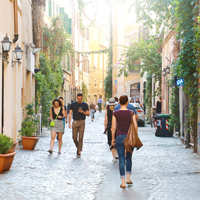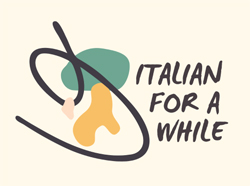Real Estate in Italy
Last updated on Jun 22, 2023
Summary: An expat should begin their search for a home to buy in Italy by researching the local real estate market and familiarizing themselves with the different types of properties available. They should also consider their budget and the type of amenities they are looking for in a home. Homes in Italy typically include amenities such as balconies, terraces, and gardens. Many homes also have modern kitchens and bathrooms, as well as air conditioning and heating systems. Foreigners are allowed to purchase property in Italy, however, there are certain restrictions in place. For example, foreigners are not allowed to purchase agricultural land, and they must obtain permission from the Italian government before purchasing a property.
How do I find a place to live in Italy?
We asked expats how they chose their neighborhood and found a place to live. They answered:
"Finding a place to live in Italy can be done through various methods, including real estate agencies and online property portals (Immobiliare.it and Idealista are popular choices). It's common to rent through an agency, which may charge a commission but help you navigate all contractual and legal aspects," wrote Brian Viola from Italian For A While.
I am a language immersion traveler—after a Gap Year in Australia, I began working to encourage this experience in my own country: Italy!
Click connect to have our partner, Brian, contact you via e-mail and/or phone.
I am a language immersion traveler—after a Gap Year in Australia, I began working to encourage this experience in my own country: Italy!
Click connect to have our partner, Brian, contact you via e-mail and/or phone.
 Italian For A While
Italian For A WhileConnect
Become ‘Italian for a While’ with IFA! Learn in Italy on a 1-week to 12-month program - open to students, young adults, graduates, digital nomads, professionals, groups, faculty-led programs, and more. Take courses at an accredited school while immersing yourself in the language, life, and culture among your international peers. Submit an inquiry with IFA to learn more.
Click connect to have our partner contact you via e-mail and/or phone.
 Italian For A While
Italian For A WhileBecome ‘Italian for a While’ with IFA! Learn in Italy on a 1-week to 12-month program - open to students, young adults, graduates, digital nomads, professionals, groups, faculty-led programs, and more. Take courses at an accredited school while immersing yourself in the language, life, and culture among your international peers. Submit an inquiry with IFA to learn more.
Connect
Click connect to have our partner contact you via e-mail and/or phone.
What is a typical expat home or apartment like in Italy?
"Let's say this answer depends A LOT on your budget and where you decide to live in the city. And if you can find something. Bolognesi have found a cash cow with Airbnb," said one expat in Bologna.

Become ‘Italian for a While’ with IFA! Learn in Italy on a 1-week to 12-month program - open to students, young adults, graduates, digital nomads, professionals, groups, faculty-led programs, and more. Take courses at an accredited school while immersing yourself in the language, life, and culture among your international peers. Submit an inquiry with IFA to learn more.
Click connect to have our partner contact you via e-mail and/or phone.

Become ‘Italian for a While’ with IFA! Learn in Italy on a 1-week to 12-month program - open to students, young adults, graduates, digital nomads, professionals, groups, faculty-led programs, and more. Take courses at an accredited school while immersing yourself in the language, life, and culture among your international peers. Submit an inquiry with IFA to learn more.
Click connect to have our partner contact you via e-mail and/or phone.
What is the average cost of housing in Italy?
If you are thinking about moving to Italy, cost of living in probably a key consideration. Expats commented about the cost of housing:
"It really depends where you look. I bought a delightful old stone row house type of home, 4 bed, 2 bath with a large terrace and glorious view in a 500 yr old building for $54,000. It's definitely livable but could use upgrades. I also bought a penthouse 1 bedroom apt, tiny but with a great view and wrap around balcony on three sides one block outside of the old town in Vicenza with elevator and a garage parking spot for $110,000," said one person in Italy.
"Well, property taxes here are incredibly low. At least compared to my native California. Houses and even apartments can be very expensive here though. There are places here in Catanzaro, apartments, overlooking a parking lot asking over 400,000 EURO! We bought our beautiful property (just outside of Catanzaro and about 15 minutes to the Mediterranean sea) with a lot of land and producing orchards and rebuilt the home spending around 600,000Euro. However, going outside the city into a rural community, even 10km outside of town, you can pay half of that. Here, neighbours are an issue and there are many lawsuits when they cannot get things sorted out (especially in our area where there are many lawyers who are unemployed). We got lucky and have a large piece of property with no problems. Here, in the country you can get a good deal. If my property were in California, we would be paying well over 1,000,000 dollars easily! We enjoy our life in the country here and wich those thinking of coming here the same good fortune," remarked one foreigner who made the move to Catanzaro.
Should I buy or rent a home in Italy?
If you have not spent a lot of time in Italy, you should rent before even thinking about buying. We asked expats there about the buy vs. rent decision:
"If you are looking to experience the Italian lifestyle, buying a home in Italy may be the best option. Not only can you enjoy the beauty and cultural atmosphere of Italy, but buying a home can also be a great investment in your future. However, if you are planning to stay in Italy for a short period of time, renting a home might be the better option for you. Renting allows you to explore the country without making a long-term financial commitment, giving you the flexibility to move around if needed," explained one expat living in Italy.
"We paid an attorney in Rome to ensure that the process was easy. He was expensive, but well worth the money. Without good language skills one is at the mercy of the system. Our attorney stood the ground for us when necessary," said one person in Minturno.
What do I need to know when buying property in Italy?
When we asked expats what advice they would give a foreigner before buying a property in Italy, they said:
"When buying property in Italy, it's important to understand the legal process, which includes obtaining a tax code (codice fiscale), hiring a notary, and navigating through the due diligence of property checks. Foreign buyers must also ensure they have the necessary permissions to purchase property," wrote Brian Viola from Italian For A While.
I am a language immersion traveler—after a Gap Year in Australia, I began working to encourage this experience in my own country: Italy!
Click connect to have our partner, Brian, contact you via e-mail and/or phone.
I am a language immersion traveler—after a Gap Year in Australia, I began working to encourage this experience in my own country: Italy!
Click connect to have our partner, Brian, contact you via e-mail and/or phone.
"1. Check with Italian government agencies to determine the legality of buying in a particular area. 2. Understand the local regulations and restrictions on foreign ownership. 3. Obtain a lawyer who is familiar with Italian property purchase laws and regulations. 4. Know the exact location of the property and the usable area. 5. Obtain a surveyor to validate the measurement of the property and any boundary issues. 6. Understand the recent taxes and bills paid on the property and the anticipated future taxes and bills. 7. Understand if there are any existing mortgages, liens or other debts that have to be paid in order to complete the purchase. 8. Make sure you have the funds available for the purchase and for any associated costs and fees. 9. Know when the sale is expected to be completed. 10. Understand what kind of insurance is needed to protect the property from potential losses," said one expat in Italy.
Are foreigners allowed to own property in Italy?
When we asked expats what advice they would give a foreigner before buying a property in Italy, they said...
"Yes, foreigners are allowed to own property in Italy. Non-EU citizens must obtain a permit from the Italian Ministry of Interior before they can purchase property in Italy. EU citizens are allowed to purchase property in Italy without a permit. However, they must register the property with the Italian Land Registry and obtain a tax identification number. Additionally, foreign investors may purchase property through a company registered in Italy," explained one person living in Italy.
"Yes, foreigners are generally allowed to own property in Italy. However, there may be exceptions for people coming from "sensitive" countries or countries that do not grant reciprocity rights to Italian citizens. All these cases are, therefore, examined on a case-by-case basis," wrote Brian Viola from Italian For A While.
I am a language immersion traveler—after a Gap Year in Australia, I began working to encourage this experience in my own country: Italy!
Click connect to have our partner, Brian, contact you via e-mail and/or phone.
I am a language immersion traveler—after a Gap Year in Australia, I began working to encourage this experience in my own country: Italy!
Click connect to have our partner, Brian, contact you via e-mail and/or phone.
What appliances are typically included in a rental?
We asked foreigners in Italy what appliances are typically included in a rental, and, if there is anything else included or not included that a newcomer would not expect. Replies included:
"In Italy, rental properties often come with a basic kitchen setup, which usually includes a stove, oven, and refrigerator. It's common for rentals to be unfurnished or semi-furnished, so major appliances and furniture may need to be provided by the tenant. Always confirm with the landlord or real estate agent what is included in the rental to avoid surprises upon moving in," wrote Brian Viola from Italian For A While.
I am a language immersion traveler—after a Gap Year in Australia, I began working to encourage this experience in my own country: Italy!
Click connect to have our partner, Brian, contact you via e-mail and/or phone.
I am a language immersion traveler—after a Gap Year in Australia, I began working to encourage this experience in my own country: Italy!
Click connect to have our partner, Brian, contact you via e-mail and/or phone.
"When renting a home in Italy, the typical appliances that come with the property include a refrigerator, stove, and clothes washer. Many homes also come equipped with air conditioning units and internet access. Some homes may also offer dishwashers, while others might provide access to a communal pool or gym. Additional amenities such as access to a shared garden or balcony may also be available," said one expat in Italy.
Additional Information about Searching for a Home in Italy:
We asked foreigners in Italy what appliances are typically included in a rental, and, if there is anything else included or not included that a newcomer would not expect. Replies included...
"Expats can search for homes in Italy by looking online for real estate listings, contacting local real estate agents, and searching for rental properties on websites such as Airbnb. Additionally, expats can look for homes in Italy by attending open houses, networking with other expats, and asking friends and family for recommendations," explained one person living in Italy.
About the Author
 Betsy Burlingame is the Founder and President of Expat Exchange and is one of the Founders of Digital Nomad Exchange. She launched Expat Exchange in 1997 as her Master's thesis project at NYU. Prior to Expat Exchange, Betsy worked at AT&T in International
and Mass Market Marketing. She graduated from Ohio Wesleyan University
with a BA in International Business and German.
Betsy Burlingame is the Founder and President of Expat Exchange and is one of the Founders of Digital Nomad Exchange. She launched Expat Exchange in 1997 as her Master's thesis project at NYU. Prior to Expat Exchange, Betsy worked at AT&T in International
and Mass Market Marketing. She graduated from Ohio Wesleyan University
with a BA in International Business and German.
Some of Betsy's articles include 12 Best Places to Live in Portugal, 7 Best Places to Live in Panama and 12 Things to Know Before Moving to the Dominican Republic. Betsy loves to travel and spend time with her family. Connect with Betsy on LinkedIn.
Additional Information:
- Italy Guide
- Healthcare & Health Insurance in Italy
- Members Talk about Healthcare & Health Insurance in Italy
- Best Places to Live in Italy
- Real Estate in Italy
- Guide to Real Estate in Italy
- Pros & Cons of Living in Italy
- Cost of Living in Italy
- 12 Best Places to Live in Italy
- Healthcare in Italy
- 5 Expat Moms Talk about Having a Baby in Italy
- Tips for Expats in Italy
- 2025 Guide to Living in Italy
- Pros and Cons of Living in Italy 2025
- 2025 Guide to Moving to Italy
- More Advice about Retiring in Italy




